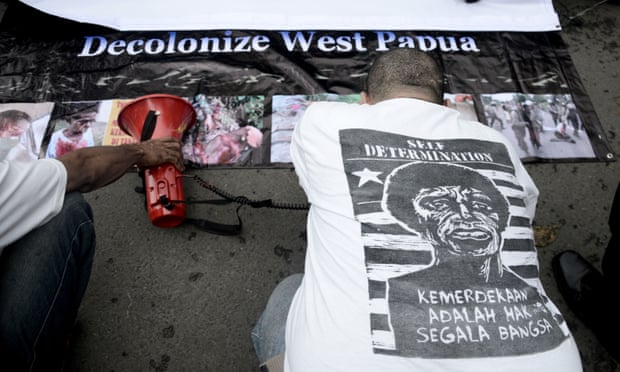Every colonial enterprise pretends to be inspired by something other than theft. The General Act of the Berlin Conference in 1885, under which the European powers carved Africa into formal colonial possessions, claimed that their purpose was “furthering the moral and material wellbeing of the native populations … and bringing home to them the blessings of civilisation”.
Similar rhetoric has attended all such seizures. To save native people from their enslavement to the Devil, or the Arabs, or each other, they had to be forced into general servitude, while their land and natural wealth were transferred to more enlightened people from overseas. Preposterous as such propaganda may seem to most of us today, it was taken very seriously. In some quarters, it still is. Take the case, scandalously neglected in both journalism and politics, of West Papua.
West Papua, the western half of New Guinea, is owned and run like a 19th-century colony. But in one respect its situation is even worse, as it is not formally recognised as such. Instead, it is treated by the United Nations and powerful countries – including the United States, Australia and the UK – as part of the national territory of Indonesia, the colonial power.
Until 1962 the Netherlands, which was then the colonial master, had planned to oversee West Papua’s transition to independence. But the Dutch came under massive pressure from the US government, for whom south-east Asia was nothing but a series of counters to be deployed in its great game against the Soviet Union. It insisted that Indonesia be allowed to “administer” West Papua, as long as its people were permitted a referendum on independence by 1969.
Indonesian administration consisted of imprisonment, torture, killing and the theft of everything on which officials and soldiers could lay hands. As the US embassy noted, around 95% of the people of West Papua supported independence. To encourage them to change their minds they were bombed, shelled and strafed, bayoneted and beaten to death. According to the Indonesian governor at the time, between 1963 and 1969 the armed forces murdered 30,000 Papuans.
Despite the riches being extracted from their land, the Papuans suffer horrendous levels of childhood malnutrition
But there still had to be a referendum. So in 1969 Indonesian officials rounded up 1,026 men, took their families hostage and, under the guns of soldiers, told them to vote. An Indonesian general explained that if they made the wrong choice they would have their tongues ripped out. Swayed by such persuasive arguments, they voted unanimously for annexation. This process was officially known as the Act of Free Choice.
There was, of course, no greater justification for this farce than for the treaties struck at gunpoint with native people in Africa, to fulfil the terms of the Berlin conference. A huge body of international law, including the agreement Indonesia had signed with the Netherlands, shows that questions of sovereignty cannot be decided this way, and that Indonesia has illegally annexed West Papua. But foreign governments affect to take the Act of Free Choice seriously.
Among the most preposterous justifications were those put forward by British officials. “Naturally one sympathises with the natives, but colonialism is not always such a bad thing, indeed it is often beneficial,” one diplomat asserted. A note from the Foreign Office advised that it is “in the general interest to turn a blind eye”, while another official report stated that government policy was “to help sustain the present moderate regime in Indonesia” (the moderate regime being President Suharto’s government, which had already killed around 500,000 opponents).
We’ve had 50 years of such excuses. Last year, foreign office minister Lord Ahmed told the House of Lords that the UK “retains its position on supporting the integrity of Indonesia”. But the principle of integrity does not apply, under international law, to occupied territories.
Doubtless these positions are unconnected to the tremendous mineral wealth of West Papua, now being exploited by multinational corporations without the consent of its people. BP, for example, is working an £8bn natural gas field called Tangguh. Vast deposits of gold, copper and petroleum, timber from the world’s largest contiguous tract of rainforest outside the Amazon, and fertile soils on which palm oil can be grown have been seized from the indigenous people – assisted by the government’s continued imprisonment, torture, rape and murder of those who resist it. Despite the riches being extracted from their land, the Papuans suffer horrendous levels of childhood malnutrition, preventable disease and illiteracy.
But last year something remarkable happened. At great risk to their lives, and in constant danger of discovery by the soldiers occupying their land, West Papuan campaigners gathered 1.8 million validated signatures and thumbprints on a petition to the UN to respect their right to self-determination. This amounts to 70% of the indigenous population. Many people were beaten and tortured for spreading it or signing it.
This month, after a year of being stonewalled, parliamentary supporters of West Papuan independence (who include Jeremy Corbyn) have at last been allowed to present this petition to the Foreign Office. Because the leader of the independence movement, Benny Wenda, lives in this country and because the UK, with its seat on the UN security council, has been instrumental in justifying the seizure of their land, using the age-old excuses for colonial rule, the attempt at international recognition begins here. The question is: will the government listen, or will it continue to pretend, as it did in 1885, that the theft of a nation is a sacred duty?
George Monbiot is a Guardian columnist and the author of Feral, The Age of Consent and Out of the Wreckage: a New Politics for an Age of Crisis.
Read the original article on the Guardian.
More about: Britain
















































